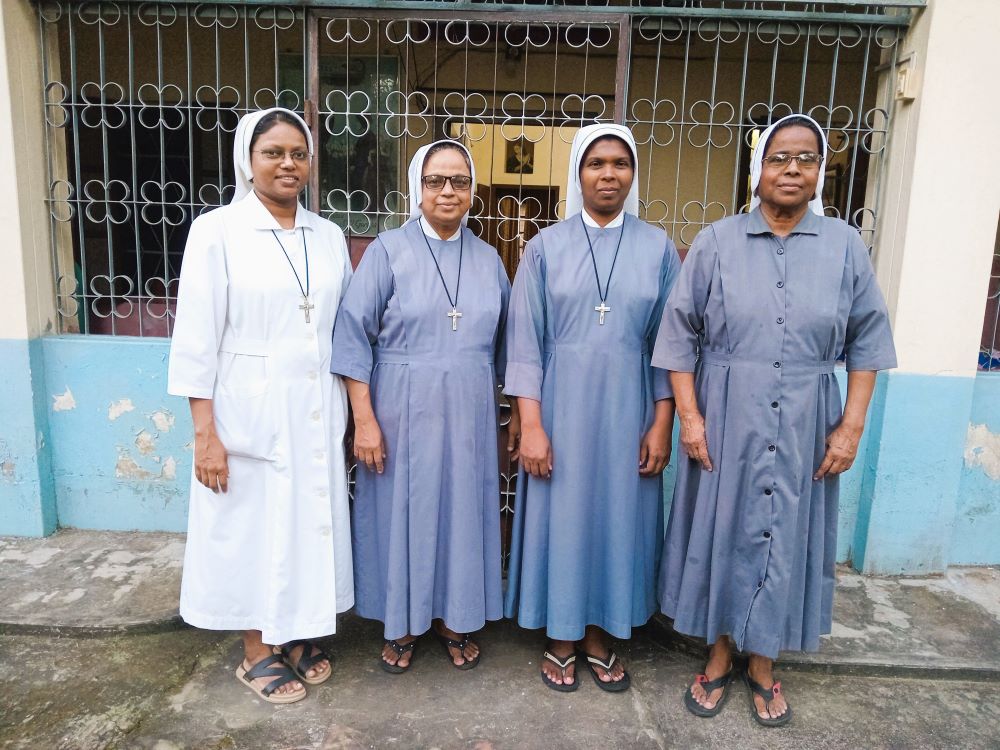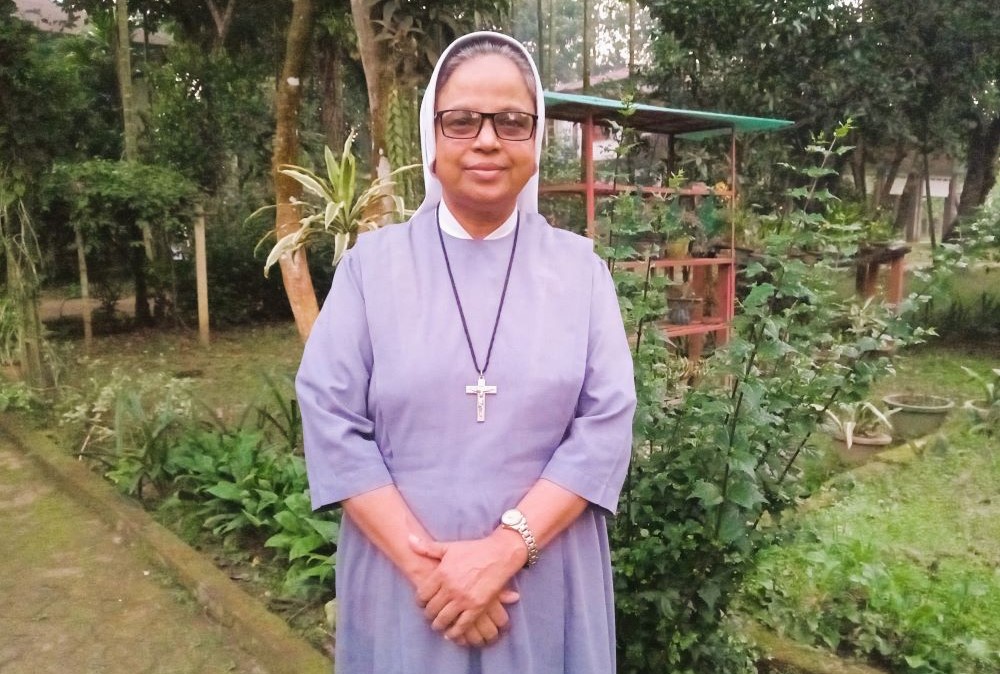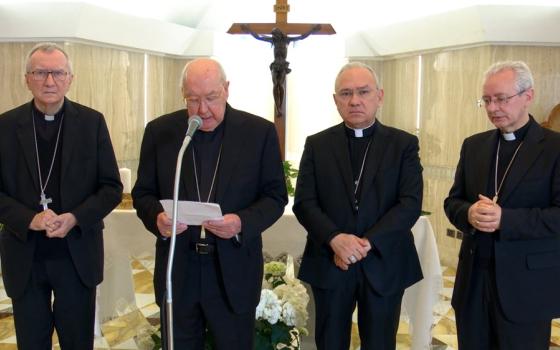Sr. Mabel Rozario visits with students at Muktidata Adivasi School, Rajshi, in Bangladesh. Rozario, a Sister of Maria Bambina, is superior of St. Gerosa Convent and headmistress of Abirerpara St. John Mary Vianney High School. (Mabel Rozario)
Sr. Mabel Rozario, a member of the Sisters of Charity of Sts. Bartolomea Capitanio and Vincenza Gerosa (locally known as the Sisters of Maria Bambina), is dedicated to empowering tribal Catholics in the Mariampur Parish in the remote Diocese of Dinajpur in Bangladesh. Serving as the superior of St. Gerosa Convent and headmistress of Abirerpara St. John Mary Vianney High School, Rozario leads a team of five nuns who actively engage in pastoral ministry.
The sisters provide family visits, counseling and catechism and operate a dispensary to address the spiritual and material needs of the community. Historically served by Italian Pontifical Institute for Foreign Missions missionaries, Mariampur Parish is now cared for by local diocesan priests and the Sisters of Maria Bambina. Established in 1930, the parish encompasses 90 villages and serves a Catholic population of 9,400, with an additional 10 catechumen villages actively preparing to join the faith. Last Easter, 20 adults were baptized, and many Hindus will soon be baptized due to the nuns' efforts.
Despite the parish's vibrant Catholic community, many parishioners are burdened by poverty and struggle to attend Sunday Mass. Social issues such as child marriage, extramarital affairs, and the influence of the dominant Muslim culture, who also practice polygamy, add to the challenges.
"I serve the lost, the last and the least," said Rozario, 60. "Through our witness in religious life, we show the community that trust and fidelity are possible — not only with God but also within marriage. Our mission is to empower them to live with dignity as Christians."
GSR: What pastoral services do you provide?
Rozario: I have served [Mariampur] for the past two years. The faithful of this parish first received Jesus Christ around 100 years ago, and even today, many people express a desire to be baptized. However, we have observed that the faith of many baptized Catholics is weak, and they face various challenges. As most parishioners are economically disadvantaged, they often prioritize daily labor over attending Sunday Mass. During our family visits to the villages, we encourage them to participate in Sunday Mass. Another major issue is alcohol addiction — many people, despite their minimal income, consume locally brewed rice wine. As nuns, we speak to them about the harmful effects of alcohol and encourage them to lead healthier lives.

Sr. Mabel Rozario, second from left, poses with her community of sisters at their convent in the Mariampur Parish, Dinajpur, Northern Bangladesh. (Sumon Corraya)
Additionally, we have noticed moral challenges, including extramarital affairs among young people and married individuals, which conflict with Bangladeshi cultural and Christian values. Marital problems are increasing rapidly. To address these issues, we provide counseling and spiritual guidance.
We also run a hostel where children from broken families find shelter. We have witnessed the suffering of children affected by parental separation. To nurture the teenagers' faith, we have established a group called Mara Goritee Sango (Maria Goretti Association). Maria Teresa Goretti was an Italian virgin martyr and one of its youngest canonized saints. Through this group, we teach Christian values to teenagers. When parents visit their children at the hostel, they are happy to see the positive transformation in their children and are inspired by our way of life as we bear witness to Jesus Christ.
Can you tell us about your school ministry?
I serve as the headmistress of St. John Mary Vianney High School, which has over 500 students. When I joined the school two years ago, I noticed teachers started their classes five minutes late. I immediately advised them that this should not happen. To set an example, we two nuns working at the school ensure we always begin our classes on time. When a teacher is absent, I take their class as a substitute.
Alongside academic education, we emphasize moral and ethical values. We provide religious instruction for Catholic students through catechism classes. For Hindu and Muslim students, we have teachers who teach their faith.
One of the biggest challenges our school faces is student dropout due to child marriage. In 2024 alone, we lost four girls to early marriage, which is heartbreaking for me. In the past, even more girls fell victim to child marriage. I am working diligently to prevent this by holding parent meetings to raise awareness about the dangers of early marriage. However, some parents still arrange early marriages for their daughters when they find a well-established groom with a stable job or business. We cannot control everything, but we can try.
Security concerns are another reason parents marry off their daughters early. Female students often face sexual harassment and violence while walking to school. I strongly advocate that child marriage is not the solution. Instead, I inform parents that child marriage contributes to high maternal mortality rates in Bangladesh. Gradually, awareness of child marriage has increased.
Advertisement
What challenges do you face as a headmistress, and how do you overcome them?
Before joining this school, I served in five different schools. When I arrived here, I noticed a lack of commitment among teachers. Many prioritize private tuition outside of school hours to earn extra income. Unfortunately, this affects their dedication in the classroom, forcing students to rely on private tuition for proper learning. I strongly discourage this practice, but stopping it is challenging because many teachers struggle with rising living costs.
I always encourage students to dream big and be ambitious. Life is a long journey, and they should set clear goals. I strive to inspire students to think beyond traditional boundaries. I remind them that they are the "fruits of love" of their guardians, and we, as teachers, are the "fathers of education." However, I have noticed that many teachers lack dedication to this noble profession. I make every effort to motivate them to embrace their responsibilities sincerely and take pride in shaping the future of young minds.
What other services do you provide in the parish?
I pursued higher studies in counseling in Italy, which allows me to provide emotional and psychological support to those who are struggling mentally. On weekends (Fridays and Saturdays), I visit Catholic villages and personally meet students who do not attend school regularly. I listen to their concerns and encourage them to return to school, which has significantly improved attendance rates. Some Catholics are unable to attend Sunday Mass, and many forget Catholic social teaching.
During family visits, I teach and remind them of these values. I also work to promote religious vocations. I encourage young girls to consider joining religious life. As a result, several girls have entered formation houses, and more are expressing interest in joining in the future. Through my service in pastoral ministry and education, I strive to uplift the faith, strengthen family values and promote education. There are many challenges, but I believe we can bring positive change to our community with faith and perseverance.

Sr. Mabel Rozario at her congregation's convent in the Mariampur Parish, Dinajpur, Northern Bangladesh (Sumon Corraya)
How do you support the catechumen villages?
Our parish oversees 90 Catholic villages. [Some] 95% are Santal, Mahali, Malo, Oraon and Mahato tribal communities, and [we also work with] 10 catechumen villages. To teach catechism, we conduct family visits, inspiring baptized Catholics and those interested in baptism. The parish catechists play a crucial role in this mission. They are the first to visit remote villages, creating a friendly and welcoming environment. Once relationships are established, we, the nuns, also visit. We provide catechism instruction if the villagers desire to learn about Jesus Christ.
We make frequent visits to the catechumen villages, bearing witness to Jesus Christ through our lives. When individuals express a sincere commitment to joining the faith, they submit formal applications for baptism. The local parish then arranges the sacrament, which is usually celebrated before Easter. Each year, many adults are baptized and become part of our faith community. As nuns, we feel blessed to contribute to bringing people into the Lord's kingdom. It is a joyful and fulfilling mission that strengthens their faith and our own.
Would you like to share anything else?
On October 5, 2024, I completed 40 years of religious life. It has been a profoundly beautiful and meaningful journey. I find immense joy in serving the destitute through words and deeds. Out of these 40 years, I dedicated 25 years to formation work. I pursued four years of theological studies in Italy, and after returning to Bangladesh, I was assigned to a formation house. I served as an aspirancy and novice mistress, guiding young women in their vocational discernment. I am deeply grateful that 40 of my students have become nuns.
I continue to serve temporary professed sisters, helping them understand and embrace religious life. It is a privilege to walk alongside them on this sacred journey.







